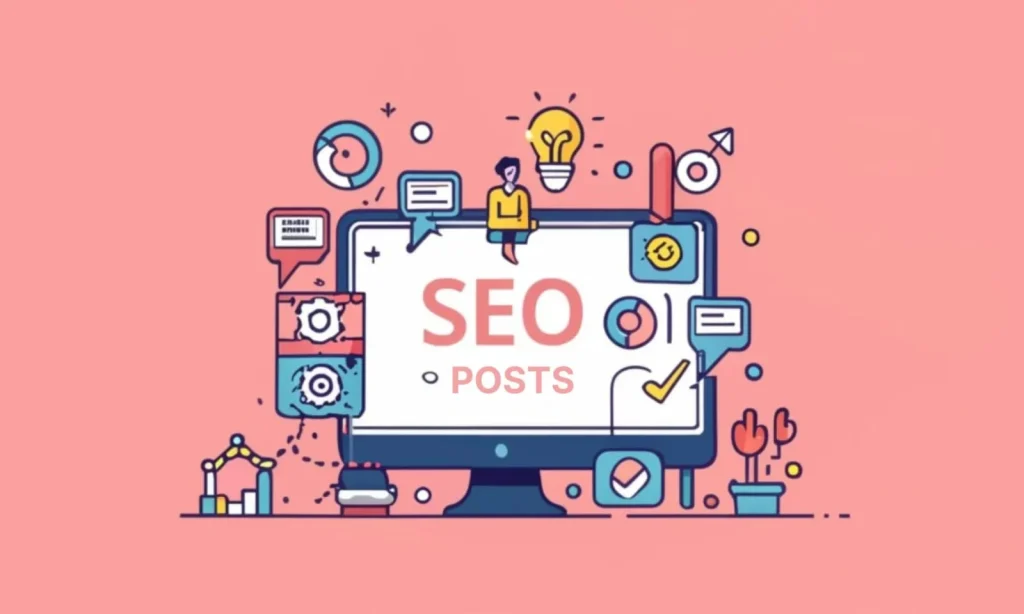E-Commerce SEO – To Drive More Sales and Revenue
For internet commerce organizations that have set their sights to expand their sales as well as revenue. E-commerce SEO techniques are as vital in the modern age as they have been in the earlier years.
Using SEO to optimize your e-commerce site for increased visitors not only leads to a greater quantity of orders but also a higher order value, increasing the site’s overall revenue.
In this article, we will elaborate and enumerate various and effective e-commerce SEO techniques. So we will guide your business triumph over the competitors and enhance the sales.
Table of Contents
1.Understanding E-Commerce SEO
Affiliate marketing can be define as the act of promoting products for a commission. So affiliate e-commerce SEO refers to the process of making your store more visible in SERPs.
Another important aspect to consider is that e-commerce SEO strategies are different from traditional websites for many reasons including the presence of numerous product pages, the category pages and others.
Clear and optimized strategies of ERP and e-commerce SEO can increase the rating of your site. So this may attract more organics, that in turn can be changed into valuable customers.
2. Keyword Research for E-Commerce SEO
Keywords research is one of the most critical elements for an effective e-commerce SEO strategy.
This way of defining key terms allows determining what customers want. And also how they can reach them with a certain message.
Search engines such as Google Keyword Planner, Ahrefs or SEMrush can be used to search for the right keywords to use.
This is because targeting keywords like ‘best e-commerce SEO strategies for small businesses’ are generally less competitive and are helpful when it comes to satisfying users’ intent.
Product Page Optimization
In as much as e-commerce SEO strategies are concerned, optimizing product pages always acts as a fundamental foundation.
It is necessary to handle each product page as Conversion-Vehicles. Which should work as Landing pages for appropriate keywords.
Another major area for utilization of the primary keyword is under the title of the product. Further in meta description and all over the product description.
Make sure that the content you put out there is interesting, meaningful, and answers possible customer inquiries.
Category Page Optimization
Hence it is evident that category pages are crucial in e-commerce SEO. These pages should rather be optimized for more generalized, generic keywords associated with certain types of product offerings.
This consists of including things like keyword rich titles, meta descriptions, and header tags. Create quantity and quality of copy about each and every category page. That is selling the products in that specific category.
3. Technical SEO for E-Commerce Websites
The second-level wheel represents some of the key concepts of e-commerce SEO. In which technical SEO plays a significant role.
It has more to do with structuring your website in this manner. That can enhance its ranking in search engines.
Here are some essential technical SEO practices for e-commerce websites:
Site Speed and Performance
Given the fact that site speed naturally affects the experience of users and attracts the attention of search engine crawlers. It can be a decisive factor.
Run a few tests that can help you check for your site’s speed and efficiency including Google PageSpeed Insights.
Do the simplest things, such as, resizing-image, enabling browser caching, and cutting down the response time of the server to improve your site’s performance.
Mobile Optimization
Since more consumers are relying on the use of mobile devices in making purchases online. It is important for e-commerce SEO to be optimized on mobile devices.
See that your site complies with the current web standards especially those that facilitate the use of mobile devices.
First, since Google rewards mobile-first indexing, a mobile-optimized site improves the site’s search rank.
Secure and Accessible Website
Panda applies significant importance to security as a factor in e-commerce SEO strategies. Make sure that your site is hosted with HTTPS. In order to offer enhanced security when users surf through your webpage.
Furthermore, ensure that your website can be used by all the faculties within the community including the disabled individuals through web accessibility.
Structured Data Markup
Applying structured data markup is beneficial for both the owner of the website, as well as the search engines, as it aids them in better content comprehension.
Use schema. tag that gives specific information about the products through specifications, prices, customer comments, and stock status.
By combining and analyzing structured data with other search queries, a program can stimulate rich snippets dramatically increasing the click with rates on the links to your ratings.
4. Content Marketing for E-Commerce SEO
In expanding your e-commerce SEO strategies, content marketing can help you a lot. Well-written and exactly targeted content will help to draw more visitors.
So it potentially glues them to your website. Here are some content marketing tactics for e-commerce websites:
Blogging
Blog maintenance enables you to produce updated articles and posts about your products or goods and services.
That you offer as well as information in your field of specialty. Contribute pieces that can answer frequently asked customer inquiries, demonstrate features and uses of products, or discuss updates and trends regarding products and services.
There is a way to include keywords within your blog to help rank better in search engines: Sevilla 2014 From our experience and findings, it is possible and advisable to write natural blog posts with the inclusion of keywords.
Product Guides and Tutorials
Develop guidelines and checklists for guidance of the clients and instructive videos to enlighten the customers about the proper utilization of the products.
These guides may be articles that have been written in blogs, YouTube tutorials or even handouts that have been compiled in PDF formats.
Their purpose goes beyond improving your product usage and increasing user satisfaction, as they also contribute to your website ranking higher and becoming more useful and informative.
Customer Reviews and Testimonials
This is mainly because customers make sure that they get credible information before they can commit themselves to any product or service being offered by the various companies.
Always, persuade those customers who have had a good experience with utilizing your products to write a review regarding the product.
Benefits include enabling a company to gain better search rankings, incremental increases in the number of conversions by influencing the buyers.
5. Link Building for E-Commerce SEO
Hence links building form an important cornerstone in e-commerce SEO strategies. Link building and especially the acquisition of quality links from relevant and reputable websites is a key factor when it comes to enhancing the credibility of your website and therefore its page ranking.
Note*
“ If you have a plan for making quality links, drop your feedback on the comment section.
I can guide you soon ”
Here are some effective link-building tactics for e-commerce websites:Here are some effective link-building tactics for e-commerce websites:
Guest Blogging
Write articles to other relevant blogs, preferably, ones that attract your demographic of interest. Provide useful information for the readers and write marvelous articles which would be useful for readers.
Ensure that the content contains a link back to your e-commerce site, either in the body of content or the author byline for successful backlinks.
Influencer Collaborations
This involves working with individuals followed within your niche to help popularize your products.
It helps to attract the attention of influencers to your site and get useful links to it. Furthermore, with the help of influencers, you can make your website more popular.
The reach of influencers depends on the niche, so select those who have many subscribers and are compatible with your brand.
Broken Link Building
Locate burst links on main websites in your core markets area. Contact the site owners and offer them to exchange popular links on their websites with links to the most popular publications in your online store.
Employing this kind of tactic can help you gain good backlinks and consequently push up your site rankings.
6. Local Seo for E-Commerce Websites
Local SEO works for any e-commerce business that has stores or physical locations or businesses targeting specific areas within a country.
Here are some local SEO strategies for e-commerce websites:
Google My Business
Create and optimize your Google My Business (GMB) profile. Ensure that your business name, Claim your business on Google My Business and modify your account according to the findings.
In addition to popular business information such as the business name, its address and telephone number (NAP) should be correct and constant in all activities.
For improvement of your local search result, you should encourage customers to post their comments on your GMB profile.
Local Keywords
Optimize your Web Site for geographic phrases by ensuring that they are included in all the pages and titles.
As for the keywords, it is recommended to incorporate phrases such as “best e-commerce SEO strategies in [city]” to focus more on customers within a given locality.
Using local keywords can assist your website to feature higher in search engine results surveys for local inquiries.
Local Citations
Local directory listings and business listings are categories of online advertising that you should opt for.
It is very important that all the information about your NAP that is found in the citation on the internet must be consistent.
It is also pointed out that improving local citations quality will help to increase your online visibility for local searches and could potentially send more traffic to your website.
7. Monitoring and Analytics
Therefore, it is crucial to pay attention to the performance of your e-commerce SEO continually and examine the results to assess whether the efforts are yielding the expected outcomes.
Regularly use different analytical tools, such as Google Analytics and Google Search Console to monitor the work of the site. Essentially, keep an eye on the organic traffic, the number of people visiting the website and bouncing back, the opposing conversion rate, and the ranking of keywords.
It is also paramount to examine the results in an effort to know which of the strategies needs modification.
Conclusion
Applying the above approaches results in improvement of the e-commerce SEO strategies allowing for better visibility of the online store, better traffic to the website and of course higher sales and revenues.
Previous SEO or search engine optimization for e-commerce should, therefore, focus on keyword research, technical work, content promotion, link acquisition, and local optimization.

